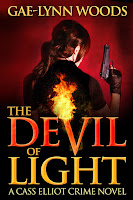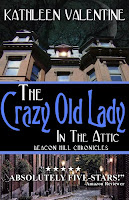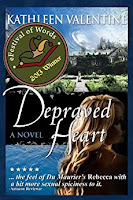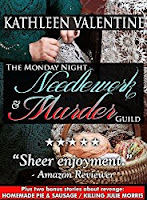I'm writing this post in the hopes that it will offer comfort to others dealing with writer's block as a result of grief. If you Google "writer's block" and "grief", you'll find loads of posts telling you to write your way through it. Many people do so, and I admire them.
Really, I envy them. Because I haven't been able to do that. I've barely been able to breathe.
It's been a tough decade. My dad has a slowly advancing case of Alzheimer's, and one of the reasons my husband and I moved to East Texas from London was to help my mom cope. And cope she did. Far longer than she should have. She made a promise to my dad that he would die at home, and she did her best to honor that promise. But eventually Alzheimer's won. It usually does.
She made the difficult decision to move him to a nursing home in May 2015. By September 2015, she had dropped dead of a heart attack that was completely unexpected. I know without doubt that she died more from grief and guilt than from any cardiac complications. In addition to overwhelming sorrow at her loss, her death left me with the challenge of closing out her estate, becoming my dad's power of attorney, and taking responsibility for watching over him. I'm lucky: my husband and two brothers are incredibly supportive, and I'm not sure how I would manage without them.
The year since my mom's death has taken a toll on my creativity, and I was naive to imagine otherwise. She had a huge personality and was an important part of our lives, and I miss her very much. I'm also dealing with the challenges of having a loved one in a nursing home. One of us is there every day to feed Daddy dinner and help get him ready for bed. But there are problems. From cuts and scrapes that refuse to heal, to continuing weight loss, to problems finding the right diapers for my dad - every new wrinkle is cause for fresh grief.
Throughout this year, I've wanted to lose myself in the next Cass Elliot novel. The story is there, waiting and wanting to be written, and I love where it's going. I've tried to write it. But every word I've put down - 40,000+ of them - has been its own tragedy. First drafts are supposed to be rough, but not this rough.
This is doubly frustrating because I'm an Achiever. Yes, with an annoying capital "A". I set a goal and work my happy little ass off until I achieve it. But not this past year. Don't get me wrong, I have achieved things. They're just not related to writing. (I have the best organized sock drawer in East Texas and we're currently running a champion / challenger diaper contest on my dad. That gives you an idea of my creative capabilities in the midst of grief.)
We're now past the one year anniversary of my mother's death, and I
am hopeful that the haze shrouding my creativity is
lifting. Characters are banging around in my head again, offering snippets of conversation and plot for this new book, and the words are slowly coming. How long will it be before I'm hitting my word count on a daily basis? I have no idea, but at last I am moving in the right direction.
I want to tell you that it's okay if you're blocked.
Nobody knows your life, your circumstances, and no one is entitled to
judge you. If the words don't flow in the midst of your grief, give
yourself a break and time to heal. The words will come back and perhaps be richer for what you've experienced.
Most importantly, hang in there and remember that you are not alone.
photo credit: plucciola Angel of Grief - drama via photopin (license)
photo credit: Dean Hochman typing paper via photopin (license)
photo credit: puacless My letter via photopin (license)
Wednesday, November 9, 2016
Wednesday, November 2, 2016
On the Loss of #Indie #Author Kathleen Valentine #amreading
Posted by
Gae-Lynn
 The indie publishing world comes together today to celebrate the life and grieve the loss of fellow indie author Kathleen Valentine. She left this world on Saturday, October 29, 2016. Along with her family and friends, her fellow authors and her readers will miss her very much. Funny, forthright, and passionate, she was a generous contributor to the indie publishing and other creative communities.
The indie publishing world comes together today to celebrate the life and grieve the loss of fellow indie author Kathleen Valentine. She left this world on Saturday, October 29, 2016. Along with her family and friends, her fellow authors and her readers will miss her very much. Funny, forthright, and passionate, she was a generous contributor to the indie publishing and other creative communities.To honor her, we're spreading the word about Kathleen and hope to keep her with us a little longer through the books she left behind.
Kathleen was a prolific writer. On Amazon you'll find her mysteries, psychological suspense, ghost stories, folklore inspired fiction, romance, and her cookbooks and knitting books. Please visit her Amazon author page to discover the many stories Kathleen leaves for us.
Tuesday, November 1, 2016
Monday, October 3, 2016
For Those Who Are Hurting - What #Love Looks Like (#Kids #Divorce #Pain)
Posted by
Gae-Lynn
There's a young woman in my life who is going through a hell of a time with her parent's divorce. It's not the divorce itself that's giving her fits, she's moving through that. It's her mother's verbal abuse (driven, I think, by feelings of guilt over her affair and abandoning her kids) that is causing this young woman such pain.
She's dealing with her mother with grace and courage, and her attitude in the face of such negativity is inspirational. I have faith that this young woman will come through this time a stronger person, but at the moment, she's suffering.
I doubt she'll see this post, but there are others who need to be reminded of what love, any kind of love, really looks like. Parental love, spousal love, love for friends and co-workers, love for pets, even love for strangers.
I hope this will encourage someone in both the giving of love and understanding what pure love looks like, and perhaps more importantly, what it does not.
She's dealing with her mother with grace and courage, and her attitude in the face of such negativity is inspirational. I have faith that this young woman will come through this time a stronger person, but at the moment, she's suffering.
I doubt she'll see this post, but there are others who need to be reminded of what love, any kind of love, really looks like. Parental love, spousal love, love for friends and co-workers, love for pets, even love for strangers.
I hope this will encourage someone in both the giving of love and understanding what pure love looks like, and perhaps more importantly, what it does not.
Wednesday, September 28, 2016
Friday, September 9, 2016
Tuesday, August 23, 2016
Friday, August 19, 2016
Sunday, July 31, 2016
Wednesday, July 6, 2016
Friday, July 1, 2016
Cass Elliot #Crime Novels are only 99cents thru July 4th!
Posted by
Gae-Lynn
You know it's true. Some folks just need killin'. They really do.
Play it safe - read the Cass Elliot Crime Novels and stay out of jail this summer.
On sale for 99cents through July 4, 2016.
Happy 4th of July!
Tuesday, June 21, 2016
Tuesday, May 10, 2016
An Update on the Prologue Controversy #amwriting
Posted by
Gae-Lynn
I recently had the pleasure of speaking at an event hosted by the Carthage Book Club at the Texas Country Music Hall of Fame. About seventy-five people attended, and we had a blast talking about inspiration, where it goes when it disappears, and how to get it back.
Having this many book lovers as a captive audience gave me a chance to run a statistically insignificant survey about the contentious topic of prologues - see original post on the controversy here.
This is what I discovered:
When I asked people to raise their hands if they read prologues, I got blank looks, nods, and a few raised hands.
When I asked people to raise their hands if they actively skip prologues, I got blanker looks and no raised hands.
So I asked people to raise their hands if they read a prologue if it's in the book, and every hand went up.

What I took from these results is that readers start reading wherever the book starts, whether the author calls that start a Prologue or Chapter 1 or something descriptive or nothing at all. As long as the beginning of a book draws them in, readers don't care what we call that beginning.
Will this tiny survey settle the debate? Not for the wider community, but it does for me.
Long live the prologue!
I'm off to go write another prologue, but I'm curious: does this feedback have any impact on whether you'll include a prologue in your next book?
Wednesday, March 2, 2016
The Prologue is Dead. Long Live the Prologue. #writing
Posted by
Gae-Lynn
 Ahh, writing advice. What glorious frustration. So little consensus. So much contradiction. As nice as it would be to think there's an absolute 'right' answer to every writing question, much of it (perhaps all of it) boils down to opinion. Seriously. Things as fundamental as the serial comma and capitalization at the beginning of a sentence (think E. E. Cummings) are negotiable.
Ahh, writing advice. What glorious frustration. So little consensus. So much contradiction. As nice as it would be to think there's an absolute 'right' answer to every writing question, much of it (perhaps all of it) boils down to opinion. Seriously. Things as fundamental as the serial comma and capitalization at the beginning of a sentence (think E. E. Cummings) are negotiable.One of the most contentious topics in writing is the prologue. Merriam-Webster defines a prologue as: the preface or introduction to a literary work. Seems innocuous enough, but apparently not. People are passionate in either direction; they absolutely love prologues or utterly disdain their use.
It's a lazy way of introducing backstory, they say.
Everybody knows that nobody reads prologues, they say. If you want anybody to read it, put it in Chapter 1.
I'm a prologue lover, and not convinced the prologue should be written off, so to speak. Check out how these Big Best Selling authors use prologues:
In FEVER OF THE BONE, Val McDermid lets the protagonist tell us how they justify the murder(s) they are committing. We get a taste the very logical insanity to follow.
J.R.R. Tolkien uses the long prologue to THE FELLOWSHIP OF THE RING to introduce the world we're entering. We learn about hobbits, their talents, their habits, even their pipe tobacco preferences. More importantly, Tolkien summarizes Bilbo Baggins' finding of the ring in THE HOBBIT, the event that drives the Lord of the Rings Trilogy.
I think Clive Cussler uses prologues in all of his books. If I've read one without a prologue, I can't remember it. His prologues are set in a period of time before the main story - sometimes centuries, sometimes decades - and provide historical context for the thriller to follow. They also provide clues to the mystery winding through that thriller.
The prologue to Stephen King's THE STAND tells us how the horror begins, and gives us a hint of the terror to come. [Charlie wakes his wife Sally in the middle of the night, in the middle of his shift at the military base, frightening her as he hustles his family into the car and off the base. Something has gone wrong. The clock went from green to red and whatever it is, whatever they do in that lab, killed those nearest it quickly. Charlie should be dead, too, but the computerized fail-safe failed and here he is, out in the wide world, driving east because the wind is blowing west. It wasn't long before Charlie was coughing steadily. (I couldn't wait to start Chapter 1.)]

In each case, the prologue makes the book better. (See? Opinion.) When I read the word 'prologue', it's as if the author has pulled out a comfy chair, giving me a chance to settle in, put my feet up, adjust that little cushion behind my back, and feel a delicious rush of anticipation about what's to come.
I love prologues when they:
- are relatively brief
- provide a bit of world building that would otherwise drag down the first few chapters
- give the reader one-up on the characters by providing a look into a villain's mind or a glimpse at a future event
- describe an event that happens in a time period different from the main story, either past or future, with a reference later in the book back to that event to give the reader that 'aha!' moment and make us feel smart

I've used prologues in the Cass Elliot novels to give readers a glimpse of the killer Cass will hunt. To share a bit of that killer's personality, psychology, or methodology. I've also used a prologue to describe a crime that occurred almost 40 years ago, that triggers the present-day mystery to follow.
How do you know if a prologue is right for your books? Read other books in the same genre and see how prologues work - or don't. If you plan to query a particular agent, visit her website and find out how she feels about the prologue. If she despises them and you love them, leave it out. If you're self-published, ask your beta readers and editor if they think the prologue adds to your story.
Bottom line: If you try to follow all the writing advice out there, you'll go nuts from trying to reconcile all the contradictions. My advice for what it's worth: find the style that works for you and stick with it. If prologues light you up, write them. If not, don't.
Do you use prologues, and if so, how? Do you like reading prologues? Why or why not?
See feedback on prologues from real live readers here: An Update on the Prologue Controversy.
photo credit: Typebars II via photopin (license)
photo credit: Un anillo para gobernarlos a todos via photopin (license)
photo credit: The Moon Lives in the Lining of Your Skin via photopin (license)
Wednesday, February 24, 2016
Nine #Romance Novels - for #FREE from @BestSellingRead
Posted by
Gae-Lynn
For all my book loving friends - sign up for the Best Selling Reads email list by February 29 and receive 9 romance novels - for FREE! See details below.

To celebrate the month of love, BestSelling Reads is giving away 9 romance novels — for FREE.
That’s right: you can download a file with 9 great romances. All you have to do is subscribe to their email newsletter. And you can unsubscribe again at any time.
Here’s what’s inside:
- – A Silent Prayer by Samreen Ahsan—paranormal romance
- – Zombie Candy by Fred Brooke—romance and action (and no zombies, but lots of candy)
- – One Shade of Red by Scott Bury—erotic romantic spoof
- – The Collins Case by Julie Gilbert—Christian romantic mystery
- – The Kiss Omnibus by Emily Kimelman—paranormal romance
- – Somewhere on Maui by Toby Neal—Hawaii romance
- – Meant for Her by Raine Thomas—New Adult romance
- – My Last Romance and other passions by Kathleen Valentine—romantic short story collection
- – The Devil of Light by Gae-Lynn Woods—police procedural mystery with a hint of romance
Tuesday, February 23, 2016
UNDER THE NAZI HEEL - New #Historical #Fiction from Scott Bury (@ScottTheWriter)
Posted by
Gae-Lynn
 New historical fiction release coming February 29 - UNDER THE NAZI HEEL by my friend Scott Bury!
New historical fiction release coming February 29 - UNDER THE NAZI HEEL by my friend Scott Bury!UNDER THE NAZI HEEL is the second book in the Walking Out of War series, which is a memoir in novel form. The books are based on the experiences of Scott's father-in-law, Maurice Bury. From 1942 to 1944, Maurice Bury was a member of the Ukrainian underground resistance and fought against the German occupation of Ukraine.
Read on for a sneak peek of Book 2, and get a copy of Book 1, ARMY OF WORN SOLES, on Amazon.
UNDER THE NAZI HEEL
Walking Out of War, Book 2
About the Book
For Ukrainians in 1942, the occupying Germans were not the only enemy.
Maurice Bury was drafted into the Red Army just in time to be thrown against the invading Germans in 1941. Captured and starved in a POW camp, he escaped and made his way home to western Ukraine, where the Nazi occupiers pursued a policy of starving the locals to make more “living space” for Germans.
To protect his family, Maurice joins the secret resistance. He soon finds the Germans are not the only enemy. Maurice and his men are up against Soviet spies, the Polish Home Army and enemies even closer to home.
Experience this seldom seen phase of World War 2 through the eyes of a man who fought and survived Under the Nazi Heel.
UNDER THE NAZI HEEL
EXCERPT 4: RECRUITED
Komorski could not hope to keep his pathetic café warm. Ice built up around the windows and at the threshold, where the cold slithered under the door. Like the rest of the patrons, Maurice kept his hat and coat on as they sipped lightly tinted water and exchanged what little news they had. “My poor cows are suffering in this weather,” said one, when the door opened and a blast of winter air slapped Maurice’s cheek and threw newspapers off the tables. Hrech Zazulak, nearly swallowed by a fur coat and hat, stepped inside and struggled against the wind to pull the door closed again. He shook the snow off himself as he scanned the room. Apparently satisfied with the people he found in the café, he opened his coat and laid it over the back of a chair.
Out of the coat, Zazulak was a tall, thin man with thinning black hair and thick eyebrows. His cheeks were hollow and always covered with black stubble, no matter how recently he had shaved. The day that Maurice had returned home after nine months of fighting in the Red Army, and weeks starving in a German prison camp, Zazulak had tried to recruit Maurice into a secret underground struggle against the German occupation.
He reached inside the fur coat and took out a broadsheet. “Latest edition, boys.” He spread it across the nearest table—Free Ukraine, only two days old. “Fritz is taking heavy losses in Tula, and Ivan recaptured Klin to the north weeks ago.”
The men gathered around the newspaper, craning their necks to read about German losses across the front, about underdressed soldiers freezing to death. There was a story about a siege of Leningrad, starvation in the streets and cannibalism.
Germany and the USSR had frozen together in a death-grip. “Can you trust this?” Maurice asked Zazulak.
“More than Pravda or the shit the Germans spew out,” Zazulak said. “But Pravda corroborates the OUN. Read it well, boys, then burn it.”
Maurice scanned the rest of the paper as well as he could, sharing it with a half-dozen men. When he looked out the window, he felt a shock at how dark it was. He pulled his scarf up higher on his neck, waved a farewell to Komorski and stepped out, careful to push the door shut.
It opened again and Zazulak stepped out, grabbing for his hat when the wind tore it off his head. He followed Maurice down the road. “You were a member, before the war,” he said.
“Don’t be ridiculous.” Maurice felt his pulse in his neck. “The Communists killed all of OUN in 1939.” He sped up, but walking against the wind, in snow half-way to his knees, made for slow going.
Zazulak put his hand on Maurice’s shoulder and stopped him. “The Soviets didn’t kill all of OUN, and neither have the Germans. And there are other organizations, too. Don’t worry, Maurice. I’m not here to betray you.”
“It’s too cold to stand here. If you want to talk to me, walk with me.” Maurice struggled through the snow, head down. The wind stung his face and snowflakes kept landing on his eyelashes.
“Ukraine needs men like you, Maurice,” Zazulak said, his voice muffled by his fur coat.
“What do you mean, men like me?” But he knew the answer.
“Men with military experience. Smart men. Able men.”
Maurice shivered and pulled his scarf over his nose. He tried to walk faster, but that just made his feet slip back with every step forward.
“Men are building an army for Ukraine,” Zazulak continued. “You’ve heard of the Ukrainian Insurgent Army.”
“Never,” Maurice lied.
About the Author
 Scott Bury just cannot stay in one genre.
Scott Bury just cannot stay in one genre.After a three-decade career in journalism, his first published fiction was a children’s story, followed by an occult spy thriller. The Bones of the Earth, his first novel, crossed the boundaries between historical fiction and magic realism. He has also published spy thrillers and two police procedurals set in Hawaii.
Under the Nazi Heel is the sequel to Army of Worn Soles. They describe the real life experiences of Maurice Bury, a Canadian living in Ukraine during World War 2.
You can find Scott’s books and other writings at his website, The Written Word, and connect with him at:
• His blog, Written Words
• On Facebook at Scott Bury Author
• His Amazon Author page
• Or on Twitter @ScottTheWriter.
Subscribe to:
Posts (Atom)


















